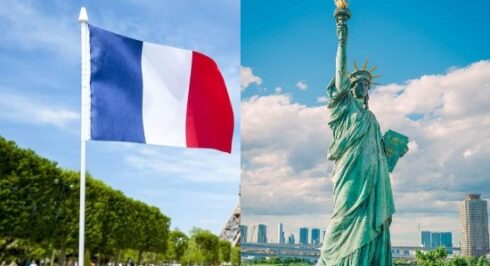Statue of Liberty: French Member of the European Parliament (MEP) Raphaël Glucksmann has sparked international debate by calling for the United States to return the Statue of Liberty. His reasoning? The U.S., under former President Donald Trump, has drifted too far from the values Lady Liberty was meant to represent. Speaking passionately at a Place Publique convention, Glucksmann argued that diminishing support for Ukraine and budget cuts for research institutions are clear signs that the U.S. is no longer the beacon of democracy and progress it once was.
While some dismissed his remarks as mere political theater, others found his concerns compelling. Could France, in a bold act of symbolic repossession, reclaim its iconic gift? And if so, would the U.S. even let it go?
A Tale of Two Liberties: France and Its Own Replica
Lest Americans feel too disheartened by this potential eviction notice, it’s worth remembering that France has its own mini Statue of Liberty. A lesser-known replica, gifted by the U.S. in 1889 to celebrate the centennial of the French Revolution, proudly stands on the Île des Cygnes in Paris. While it’s certainly smaller than its New York counterpart, it still carries the same ideals of freedom and democracy.
Statue of Liberty: Would reclaiming the larger Lady Liberty make the French version the one true statue? That remains to be seen. But Glucksmann’s proposal raises an interesting question: Does a country still deserve a symbolic gift if it drifts from the values it was meant to uphold?
America on Trial: The Changing Symbolism of Lady Liberty
Glucksmann’s critique didn’t stop at American policy. He also took aim at right-wing French politicians who openly admire Trump and tech mogul Elon Musk, arguing that their support reflects an ideological shift that contradicts the values France and the U.S. once shared. His message was clear: if the U.S. no longer embodies liberty, equality, and fraternity, then France should take back the Statue of Liberty as a statement against those drifting away from democratic ideals.
While some may see this as an overreaction, others believe Glucksmann is highlighting a serious issue: if national symbols matter, shouldn’t their meaning be protected? If America no longer stands for what Lady Liberty represents, does she belong elsewhere?
A Diplomatic Dilemma or Just Political Grandstanding?
The reaction to Glucksmann’s remarks has been mixed. Some critics have accused him of political grandstanding, using a beloved international symbol to gain attention in France’s political sphere. Others, however, see his statement as a bold call for Western democracies to reflect on their values in an era of shifting global politics.
Would the U.S. ever consider returning the statue? Almost certainly not. However, the debate sparks deeper questions about the evolving relationships between allied nations and the shifting nature of democracy in the 21st century.
If France Takes It Back, Then What?
Assuming, for a moment, that the U.S. agreed to ship Lady Liberty back to France, what would happen next? Would she stand proudly in Paris, or would the French repurpose her for a new message—perhaps one directed at the U.S. itself?
While the logistics of moving a 151-foot statue across the Atlantic are daunting, the symbolism behind such an action is even more complex. Would America respond by demanding the return of its own gifts to France? Would France use the opportunity to redesign Liberty’s torch to hold a baguette instead? The possibilities are endless.
Statue of Liberty’s Symbolism Beyond Borders
At the heart of Glucksmann’s argument is a serious question: Who deserves to be the guardian of a global symbol of freedom? While his call to reclaim Lady Liberty may be more symbolic than actionable, it serves as a reminder that democracy is not static—it must be continuously upheld and defended.
As amusing as the image of a French repo team arriving in New York Harbor with a giant crane might be, the real takeaway is this: symbols matter. Whether in France or the U.S., Statue of Liberty will always be a powerful reminder of the ideals she was meant to represent. The question now is: Which nation will work hardest to honor them?














